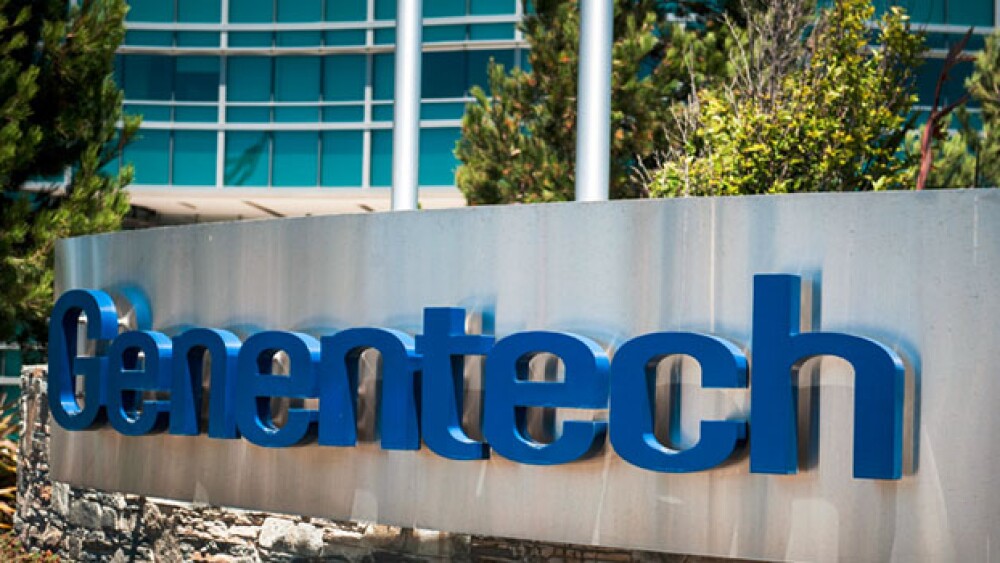Genentech, a Roche company, presented data from its FIREFISH clinical trial of risdiplam in Type 1 spinal muscular atrophy (SMA) at the American Academy of Neurology Annual Meeting.
Genentech, a Roche company, presented data from its FIREFISH clinical trial of risdiplam in Type 1 spinal muscular atrophy (SMA) at the American Academy of Neurology Annual Meeting.
The drug is an oral survival motor neuron-2 (SMN2) splicing modifier and is part of a collaboration with the SMA Foundation and PTC Therapeutics. FIREFISH is a two-part pivotal clinical trial in infants with Type 1 SMA. Part 1 was a dose-escalation trial in 21 infants.
SMA is a severe neuromuscular disease caused by a mutation in the SMN1 gene, which codes for SMN, a protein necessary for motor neuron function. The disease is noted by the loss of motor neurons, which leads to progressive muscle weakness and paralysis. It is rare, occurring in about one in 10,000 live births. Type 1 is lethal and typically results in death by the age of two years.
In FIREFISH Part 1, infants showed key motor milestones after one year of treatment with risdiplam. Among the babies receiving the dose chosen for the confirmatory Part 2 of the trial, seven, or 41.2%, were able to sit without support for at least 5 seconds. Also, 11 (64.7%) were able to sit with or without support while nine (52.9%) had upright head control after 12 months of treatment. One infant hit the milestone of standing by the 12-month mark.
“The continued improvements in motor milestones and function in the FIREFISH study to date are meaningful for this typical SMA Type 1 population where the majority of babies started treatment at nearly seven months old,” stated Giovanni Baranello, the FIREFISH study lead investigator with the Carlo Besta Neurological Research Institute Foundation in Milan, Italy. “These encouraging findings further validate a treatment approach that increases survival motor neuron protein in both the central nervous system and throughout the body.”
The company also presented new data from Part 1 of its SUNFISH trial in people between the ages of 2-25 years with Type 2 or 3 SMA. As earlier data indicated, there was a sustained median increase from baseline in SMN protein of at least two-time or more, as measured in the blood, after 12 months of treatment.
The company plans to include this data in filings with the U.S. Food and Drug Administration (FDA) and European Medicines Agency (EMA) in the second half of this year.
That makes them a bit late to the market, however. Currently, the only drug on the market for SMA is Biogen’s Spinraza (nusinersen). Spinraza is priced at $750,000 for the first year and $375,000 for every year after. It is approved for all forms of SMA, types 0 through 5.
Novartis’ AveXis released interim data from the Phase I STRONG trial, additional data from the STR1VE trial, and the first data from the Phase III SPR1NT trial at AAN this weekend for its drug Zolgensma (onasemnogene abeparvovec-xioi). Zolgensma is a gene therapy in development as a one-time infusion for SMA Type 1. It uses a virus vector to deliver a copy of the human SMN gene.
In December, the FDA accepted AveXis’ Biologics License Application (BLA) for Zolgensma, with a target action date in May 2019. It is also expected to be approved in Japan and the European Union later this year.
Zolgensma, if approved, will only be for patients with Type 1. Zolgensma is also believed to be a one-and-done gene therapy that will not require more than a single treatment.
Sandra Horning, Roche/Genentech’s chief medical officer and Head of Global Product Development, stated, “We are highly encouraged by our latest findings for risdiplam, which takes us one step closer to potentially bringing the first oral treatment option to the SMA community. While SMA has seen important advances over the past few years, significant medical need remains for people living with all types of SMA across multiple age groups.”





